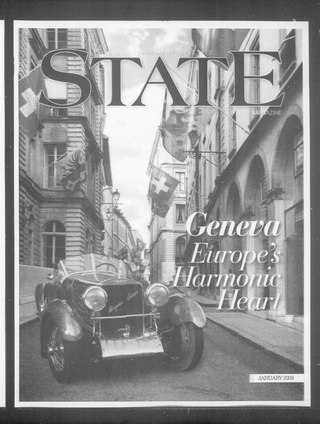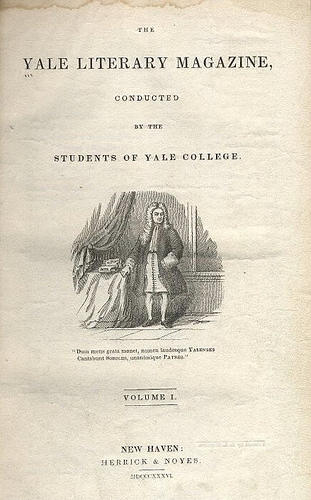
A magazine is a periodical publication, generally published on a regular schedule, containing a variety of content. They are generally financed by advertising, purchase price, prepaid subscriptions, or by a combination of the three.

The National Police Gazette, commonly referred to as simply the Police Gazette, is an American magazine founded in 1845. Under publisher Richard K. Fox, it became the forerunner of the men's lifestyle magazine, the illustrated sports weekly, the girlie/pin-up magazine, the celebrity gossip column, Guinness World Records-style competitions, and modern tabloid/sensational journalism.
Frank Luther Mott was an American academic, historian and journalist, who won the 1939 Pulitzer Prize for History for Volumes II and III of his series, A History of American Magazines.
Ralph Edlin Luker was an American historian, teacher, and the author of several books about race, religion and the Civil Rights Movement.

The American Review, alternatively known as The American Review: A Whig Journal and The American Whig Review, was a New York City-based monthly periodical that published from 1844 to 1852. Published by Wiley and Putnam, it was edited by George H. Colton, and after his death, beginning with Volume 7, by James Davenport Whelpley. As of Volume 10, July 1849, the proprietors of the journal were Whelpley and John Priestly. The American Review was allied to the Whig Party.

The Yale Literary Magazine, founded in 1836, is the second-oldest student literary magazine in the United States, next to The Columbia Review, and publishes poetry, fiction, and visual art by Yale undergraduates twice per academic year. Notable alumni featured in the magazine while students include Susan Choi, Sinclair Lewis, Meghan O'Rourke, ZZ Packer, Max Ritvo, Sarah Sze, and Thornton Wilder. The magazine's editor-in-chief is currently Uma Arengo.
Newspapers and news magazines have always been an important source of information for Methodist churches and their members and constituents. In the US, there have been a variety of instruments published over the years, some by General Conferences, others by annual conferences, others by individuals.

The Portico: A Repository of Science & Literature (1816–1818) was a short-lived Baltimore literary journal founded and edited by Stephen Simpson and Tobias Watkins. The monthly journal was formed to publish the members of a small Baltimore literary society, called the Delphian Club. The Portico's contributors include John Pierpont, a poet, and John Neal, a poet, novelist, and journalist who went on to write for English periodicals such as Blackwood's Magazine and to serve as editor of several American papers.
The Genesee Farmer or Genesee Farmer was a very early periodical founded by Luther Tucker in 1831 in Rochester, New York. It was devoted to agriculture and horticulture as well as the domestic and rural economy.

Nathan Hale was an American journalist and newspaper publisher who introduced regular editorial comment as a newspaper feature.

Joseph Tinker Buckingham was an American journalist and politician in New England. He rose from humble beginnings to become an influential conservative intellectual in Boston.

George Wilkes was an American journalist and newspaper editor. A native of New York State, he became a journalist and after losing a libel case was imprisoned in New York City's jail; he wrote a pamphlet on the jail's conditions in 1844 based on his stay. The following year, Wilkes and a friend started publishing the National Police Gazette, a newspaper on crime reporting and other sensationalistic topics. In 1856 Wilkes bought a sporting newspaper called the Spirit of the Times, which he had previously worked for.

The Royal American Magazine, or Universal Repository of Instruction and Amusement was a short-lived monthly periodical published in Boston, Massachusetts, by Isaiah Thomas and later by Joseph Greenleaf. It supported patriot and revolutionary sentiment in the Colonies against the Kingdom of Great Britain, and had contributors that included John Hancock and Paul Revere.
The Polyanthos was a monthly literary magazine published in Boston, Massachusetts, by Joseph Tinker Buckingham from December 1805 – September 1814.
Michael Charles Alston Mott was a British-born American author. He produced eleven poetry collections, four novels and a renowned biography of Thomas Merton.
The American Museum was a monthly American literary magazine published by Mathew Carey in the late-18th century. The American Museum shares with the Columbian Magazine the honor of being the first successful American magazine."
The Boston Miscellany of Literature and Fashion was a monthly literary and fashion magazine published in Boston, Massachusetts from 1842 to 1843. It also published book reviews and music.
Lydia Jane Wheeler Peirson was an American poet, nicknamed "the forest minstrel".
The Literary World was a weekly American magazine founded in February 1847 by Osgood and Company in New York City. It closed in 1853 following a fire. It has been described as "the first important American weekly to be devoted chiefly to the discussion of current books" and is said to "contain much valuable material on the development of American literature from 1847 to 1852".











